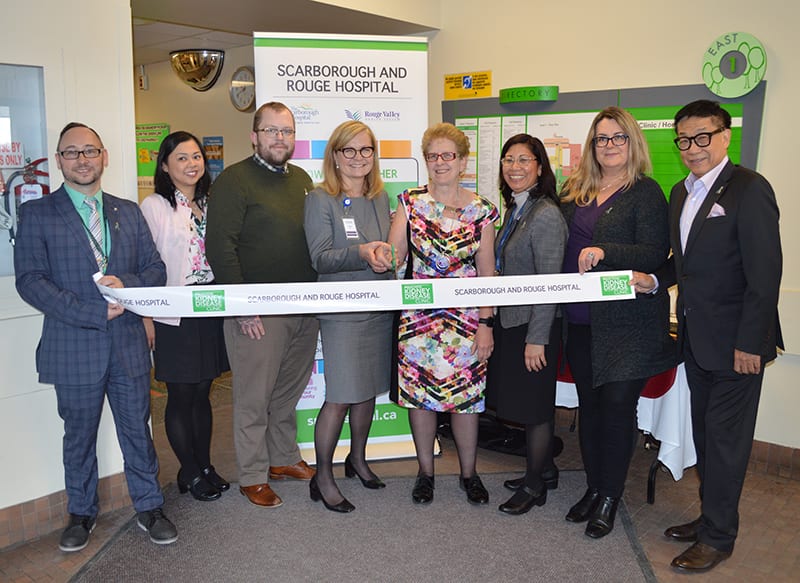Photo above: Katarina Nemcova (second from right) attends a ribbon-cutting ceremony for the hospital’s new Polycystic Kidney Disease Clinic with SRH staff, physicians, and special guests.
Katarina Nemcova is a self-employed registered massage therapist who lives in Toronto and loves to travel south to swim in the ocean.
Katarina also has polycystic kidney disease (PKD), which causes progressive cysts on the kidneys, enlarging them slowly, and leading patients to need dialysis until they must have their kidneys removed and undergo a transplant surgery.
At 50 years old, Katarina has been coping with and researching PKD for most of her life. She has been a patient of Dr. Janet Roscoe, a nephrologist at Scarborough and Rouge Hospital (SRH), for close to 25 years.
There is usually a family history of PKD, something Katarina knows all too well. She lost her grandmother to the disease at age 62. And her mother passed away at age 54 while still in the hospital after receiving her second kidney transplant.
“I made a lot of life choices based on the fact that I have PKD, knowing sooner or later I will have to deal with it,” said Katarina. “I chose not to have children because I’m here by myself in this country, and I worried about who would look after my kids if I need to be on dialysis.”
According to the Kidney Foundation of Canada, about 5% of all people requiring dialysis or kidney transplantation have #PKD, one of the most common life-threatening genetic diseases. But now, patients in Scarborough and beyond have greater access to diagnosis and additional treatment options in the management of PKD with the official opening of SRH’s new PKD clinic on April 4. The new clinic will run biweekly on Wednesdays from 9 a.m. to noon at the Multi-Care Kidney Clinic, First floor, East Wing, General site.
SRH has partnered with Otsuka Canada Pharmaceutical Inc., manufacturer of JINARC (tolvaptan), the first treatment indicated to slow the progression of kidney enlargement in PKD. Patients who meet the conditions for treatment with JINARC, and who only have partial private health insurance coverage or none at all, can apply to the ORIJIN Patient Support Program sponsored by Otsuka, which offers financial assistance and compassionate access programs.
“I feel very fortunate to be a part of the program, and I wish I had JINARC 20 years ago,” said Katarina. “Before I started taking the medication, I felt nauseous every morning. But not anymore.
“Before, there was a lot of pressure on my lungs when I exercised. I love the elliptical machine but I do six or seven minutes and my heartbeat is in the red zone because the kidneys are not pumping sufficiently. As soon as I started taking JINARC I felt like my breathing was easier.”
Along with the treatment, a key component to success with the PKD Clinic is SRH’s interprofessional team of experts. Research shows that early screening and management, which involves many health care providers including nephrologists, nurses, dietitians, social workers, and pharmacists, have led to positive patient outcomes and improved self-management of the disease.
For Katarina, whose kidneys are each three litres (“like the size of two little babies”), interaction with the interprofesional team is perhaps one of the most helpful aspects of the program. (For context, healthy kidneys are about the size of a mouse.) Katarina has a thirst for information related to improving her self-management of PKD.
“Speaking with a dietitian through this program was an eye opener. I thought I was eating healthy; whole wheat bread, snacking on cherry tomatoes and pickles, not candy. But I learned I should be eating white bread, and there are even limits with fruits and vegetables. The kidney cannot process some of the healthy stuff the body needs.”
She also finds peace of mind after every meeting with Janice Javier, staff nurse with SRH’s nephrology team. Janice takes the time to patiently explain what is happening with her PKD so Katarina always knows where she stands, and finds that it is empowering.
Katarina has been on the program for about two years, and credits it with helping her to delay the need for dialysis a few years more.
“My kidney function could still be better but it is nice that my kidneys are shrinking, which is what the treatment does. The monthly bloodwork is a very small price to pay and I’m grateful to know what is happening with my kidney function each month.”
Her advice to other patients living with PKD?
“Maintain a good relationship with your nephrologist, get on a program like this, and get more information from the right resources. Watch your sodium and sugar. And, I’ve found that swimming in the ocean has done wonders. I can swim for hours a day. It lifts the kidneys and you don’t worry about the pressure and the weight.”
Katarina knows there is no cure for PKD, but she is encouraged by the recent advancements made in the field. She is optimistic that someday she is going to beat this disease.
“One day I will be living with a bionic kidney! Maybe not for a few more years, but to know they are working on such advancements helps you feel there is a light at the end of the tunnel. For now, I choose to make the best of my life!”
April 15, 2019: An earlier version of this article stated that roughly 10 per cent of Scarborough residents are living with PKD. Scarborough Health Network regrets the error.

